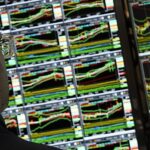US stock futures experienced a decline on Monday as investors looked ahead to a series of statements from Federal Reserve officials and an important inflation report, hoping to glean insights regarding future interest rate cuts. The Dow Jones Industrial Average futures fell by approximately 0.4%, while S&P 500 futures saw a minor decrease of 0.3%. The tech-heavy Nasdaq 100 futures also dropped around 0.3%, following a robust week for equities that had thrilled investors with the Fed’s return to a more accommodative monetary policy.
In a notable development in commodity markets, gold prices surged to an all-time high, surpassing $3,750 per ounce. This increase stems from speculation that the Fed may implement two additional rate reductions before the close of 2025. Conversely, the cryptocurrency market faced a downturn, with bitcoin and other digital tokens losing value as traders offloaded over $1.5 billion in bullish positions.
The market’s focus will soon shift to Friday’s data release concerning the Federal Reserve’s preferred inflation measure, the personal consumption expenditures price index (PCE). Analysts predict that a weak inflation report could potentially heighten expectations for another quarter-point rate cut in October. Current forecasts suggest that while September’s PCE might reflect ongoing price pressures, the overall trend remains relatively subdued, keeping the Fed on its planned course.
Investors are also gearing up for insights from several Federal Reserve speakers slated for the coming days, including Chair Jerome Powell and the newly appointed Fed governor Stephen Miran, who is expected to share his policy insights during his speaking engagement in New York on Monday. Powell is scheduled to address the public on Tuesday.
In addition to these developments, the markets were attentive to the repercussions of recent immigration policy changes introduced by President Trump. The administration announced a sharp increase in fees for H-1B work visas, which will now cost US companies $100,000 annually. This policy has raised immediate concerns among major firms like Microsoft and Goldman Sachs, which swiftly alerted their workforce regarding the potential impact. Despite this, shares of large technology companies remained relatively stable in premarket trading.
Looking ahead at earnings reports, the spotlight will be on Micron Technology for updates related to artificial intelligence-driven demand, as well as Costco for data reflecting consumer spending patterns.
On a corporate front, Oracle is set to secure TikTok’s algorithm under a deal backed by the Trump administration. Reports suggest that the agreement would allow Oracle to operate and safeguard the data of US TikTok users, with a stipulation that ByteDance will no longer have access to this information. Oracle’s shares rose by 0.8% in premarket trading, with a year-to-date gain of 85%.
As the economic landscape continues to evolve, Wall Street is gearing up for a week filled with comments from Fed officials and significant economic data releases following the recent rate cut, which has driven stocks to record highs.
In premarket trading, notable movements were observed among select stocks. Snap Inc. saw its stock rise by 7%, following positive sentiment among advertisers, while Intel experienced a 1% dip. Amid a broader selloff in cryptocurrencies, Coinbase shares fell by 3%. The tech giants, referred to as the “Magnificent Seven,” remained largely unchanged despite the recent immigration policy changes, with major firms like Apple, Nvidia, Microsoft, and others trading within a tight range.
In other stock news, BYD’s shares dropped in Hong Kong following reports that Warren Buffett’s investment firm had sold its stake in the Chinese electric vehicle manufacturer. Conversely, Samsung Electronics saw a more than 5% surge after Nvidia granted permission for the use of advanced memory chips, marking a significant partnership for the South Korean tech company.
Overall, as traders navigate these turbulent waters, sentiment in Asian markets has also been affected by concerns over the new H-1B visa fees, indicating a broader apprehension across the global economic landscape.







